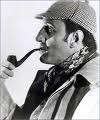Basil Rathbone
Basil Rathbone
 Basil Rathbone was known as the master of stage and screen, and he also made an indelible mark in radio. He thought radio was a terrific means of communication and was quoted once as saying, “Radio is unquestionably a superior medium to television because it makes us use our imagination.”
Basil Rathbone was known as the master of stage and screen, and he also made an indelible mark in radio. He thought radio was a terrific means of communication and was quoted once as saying, “Radio is unquestionably a superior medium to television because it makes us use our imagination.”
As early as 1936, Rathbone appeared on NBC radio’s The Shell Chateau with Alice Faye, George Jessel and Edward G. Robinson and in 1937, he supposedly appeared on an early radio show, The Cinnamon Bear, in The Flying Hat episode where he played the Grand Wonky. His highly identifiable voice is the only proof of that stint.
Rathbone later appeared in Lux Radio Theater on episodes with William Frawley, Joan Crawford, Carole Lombard and Jeffrey Lynn, The Lifebuoy Program with Al Jolson and also appeared on the panel of an intellectual quiz show called Information Please. In 1939, he was cast in the Screen Guild Theater’s production of Can We Forget with George Murphy, Bette Davis and Robert Montgomery.
When NBC’s, The Circle, first appeared on the radio, Basil Rathbone was featured to discuss literature, drama and current events along with Ronald Colman, Cary Grant, Groucho Marx and Madeleine Carroll. He replaced Colman as emcee when Colman quit the show only five weeks after its debut.
Perhaps the most popular of Rathbone’s stints on radio was The Adventures of Sherlock Holmes, which debuted in 1939. Nigel Bruce played Holmes’ assistant, Dr. Watson. Rathbone and Bruce played Watson and Holmes on radio from October 1939 through May 1946.
Basil Rathbone appeared on many episodes of the Screen Guild Theater including Variety in 1940 along with Jack Benny, Claudette Colbert and Edward Arnold.
In January 1941 he was a guest on the Bob Hope Show and in April 1946 he was a guest star on The Fred Allen Show. He starred in many episodes of The Cavalcade of America including John Yankee and Portrait of an Author both in 1950.
Rathbone’s full name was Philip St. John Basil Rathbone, and he was born in 1892 in Johannesburg, South Africa. He and his family fled the invading Boers in 1895 because of accusations that his father was a British spy – although, in a later biography, Rathbone says that he never asked his father about the rumor.
After moving to England, Rathbone attended school and was more interested in sports than schoolwork. He came to develop a deep appreciation and love for the theater. His father dissuaded him for a while in making the theater his profession and Rathbone worked for a year at an insurance company, but his longing for the theater never deserted him.
Basil Rathbone passed away from an apparent heart attack in 1967 at age 75. He left behind a son, Rodian and three grandchildren. His daughter, Cynthia passed away in 1969 at the age of 30 from a brief illness.
Happy listening my friends,
